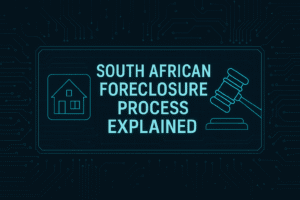Debt Free: 5 Ways to Avoid Debt (South Africa 2025 Guide)
If you’re dreaming about a debt‑free life in South Africa—owning your home without sleepless nights over bills—this guide is your blueprint. We’ll show you five practical, proven ways to avoid debt (or escape the spiral if you’re already in it), tailored to the realities of South African homeowners: rising living costs, bond repayments, rates and taxes, levies, and the constant temptation of easy credit.
Important: Real Estate Assist is not a bank and does not offer loans. We specialise in property‑backed solutions that help homeowners prevent repossession, stop auctions, unlock equity responsibly, and choose the best path—whether to keep the home or exit with dignity and maximum value.
Contents
- Why “Debt Free” is the smartest goal in 2025
- Way 1: Build a real‑life budget you’ll actually use
- Way 2: Stress‑test affordability before you borrow
- Way 3: Eliminate debt traps and set spending guardrails
- Way 4: Use your property smartly—without taking new unsecured debt
- Way 5: Build a financial moat: savings, insurance, income
- Homeownership realities: don’t ignore the “hidden” costs
- Mortgage myths vs facts (South Africa)
- Decision map: which path fits your situation?
- Checklist: 30‑minute debt‑free tune‑up
- FAQs: Debt‑free living for South African homeowners
- Next step: Get a free, no‑obligation proposal from Real Estate Assist
Why “Debt Free” is the smartest goal in 2025
Being debt free doesn’t only mean “no more accounts.” It means control: you decide what your money does next—build emergency savings, invest in your family’s future, or upgrade your home at the right time and price. In a climate of high living costs and rate volatility, the best defensive strategy is a simple plan you can follow consistently.
The good news? You don’t need a financial degree to do this. You need five habits, repeated—plus a property strategy that doesn’t put your home at risk.
Way 1: Build a real‑life budget you’ll actually use
A budget is not a spreadsheet—it’s a decision‑making system. The goal is agility and awareness, not punishment. Here’s how to set one up that works in South Africa.
1) Separate Housing from Living budgets
- Housing: bond, rates & taxes, levies/HOA fees, homeowner’s insurance, life cover tied to the bond, security, maintenance (aim for 1–2% of property value per year), garden/pool.
- Living: groceries, transport, school, medical aid & gap cover, data/internet, mobile, streaming, clothing, giving, lifestyle, emergencies.
Keeping two buckets helps you see true affordability at a glance and prevents you from underestimating homeownership costs.
2) Choose a method you’ll stick with
- Zero‑based budget: give every rand a job before the month starts. Great for tight months.
- 80/20 or 50/30/20: automated splits for a quick start. Adjust to your life.
- Envelope method (digital): separate accounts or sub‑accounts for big categories (e.g., “Rates & Taxes,” “Levies,” “Maintenance,” “School”).
3) Add sinking funds for irregulars
Annual or irregular expenses (vehicle licence, school uniforms, car service, holiday, TV licence, licence renewals) must be funded monthly into a sinking fund. This one habit is a debt‑killer.
4) Track weekly, decide monthly
- Weekly: 10‑minute check‑in—any category near its limit? Adjust now.
- Monthly: Look at last month’s overs/unders; re‑allocate this month’s plan.
Quick template (categories to copy)
Housing: Bond • Rates & Taxes • Levies/HOA • Home Insurance • Life Cover (bond) • Security • Maintenance (1–2% p.a.) • Garden/Pool • Repairs • Appliances • Internet
Living: Groceries • Fuel/Transport • Medical Aid & Gap • School/Childcare • Mobile/Data • Streaming • Clothing • Personal Care • Insurance (car/contents) • Giving • Gifts • Sport • Family Support • Pet Care • Emergency • Sinking Funds (Car, School, Holidays, Licences)
Budget truth: If an expense doesn’t exist in the budget, it will exist as debt later. Make everything visible.
Way 2: Stress‑test affordability before you borrow
Debt becomes dangerous when it’s based on best‑case assumptions. Before you take on (or restructure) a bond or any major commitment, stress‑test it.
Run three scenarios
- Base case: Today’s rate and income. Can you pay comfortably and save 10%?
- Tough case: +2% rate and –10% income for 6 months (overtime drops, side income slows). Still okay without using credit?
- Opportunity case: Same instalment but you overpay ±R500–R1,000 p/m. How much time/interest do you save?
Keep debt payments conservative
As a simple guardrail, keep all monthly debt payments under a conservative share of net income. The lower, the safer. If you can’t achieve that, the home (or car) may be priced too aggressively for now.
Avoid risky structures
- Interest‑only or balloon structures transfer risk to your future self. If your income is variable, double‑avoid.
- Watch the debt term. Lower instalments via longer terms often increase total cost—and lock you in.
Automate a small overpayment
Even R250–R500 extra on a bond can shave years off, especially early on. Automation beats willpower.
Bottom line: If your numbers only work in sunshine, they won’t work in real life. Stress‑test or press pause.
Way 3: Eliminate debt traps and set spending guardrails
Most households don’t go into debt because of one big mistake—it’s the hundred small ones. Here’s how to create guardrails that keep you on track.
Shut the “leaks”
- Freeze (or reduce) card limits you don’t need. Lower limits = lower risk.
- Unsubscribe from auto‑renew services you don’t use (apps, streaming, gyms). Audit quarterly.
- Price‑check car/household insurance annually; negotiate.
Add friction to impulse spending
- 24‑hour rule for all non‑essentials. If it still matters tomorrow, budget for it.
- Use cash‑equivalent for discretionary categories (separate debit card or sub‑account). When it’s gone, it’s gone.
Tackle interest the smart way
- Avalanche: pay extra to the highest‑interest debt first (store cards/credit cards), minimum on the rest.
- Snowball: pay off the smallest balance first for quick wins, then roll the payment forward.
- Close or reduce the old line once paid to prevent re‑spend.
Protect your credit
- Automate all minimums to avoid late fees and hits to your record.
- If you’re struggling, talk to creditors early. Hard conversations now beat legal letters later.
Guardrails win. You don’t need perfect discipline—just a system that makes the right choice the easy choice.
Way 4: Use your property smartly—without taking new unsecured debt
For homeowners, the biggest wins (or losses) come from how you manage your property. Many people reach for unsecured consolidation loans when pressure builds. That can backfire—raising total cost and placing your home at risk if the budget remains tight.
Real Estate Assist provides non‑loan, property‑backed solutions designed to protect value, stop legal action, and align with your goals:
Recovery (Keep Your Home + Buy‑Back Option)
If you have equity and income but need time to stabilise:
- Sell to an impact investor, lease back your home, clear arrears, and lock a buy‑back option at pre‑agreed prices.
- Rebuild your credit while staying put; repurchase within an agreed window.
Joint Venture Sale (Maximise Proceeds)
If selling is smarter but you don’t want a distressed price:
- Partner with an investor to fund strategic improvements and marketing.
- Settle arrears, repay creditors, and aim for a higher net through an orderly sale.
Breather (Orderly Exit with Time and Upside)
If you need to sell but require time and stability:
- Sell to an investor now, remain temporarily at a reduced rate while the home is improved and sold.
- Receive a pre‑agreed payout on successful sale.
Rebound (Pre‑Auction Mortgage Resolution)
If legal action is looming and equity is limited:
- Structured resolution with the bank to avoid sale in execution.
- Secure a dignified exit and preserve as much value as possible.
Key message: These are not loans. They’re structured property transactions that deal with the bond and legal risk directly, often producing better long‑term outcomes than layering new unsecured debt on top of an already stressed budget.
Way 5: Build a financial moat: savings, insurance, income
“Debt free” is easier when shocks don’t become crises.
Emergency fund (start small)
Aim for R10,000–R20,000 as a first milestone, then grow toward 3–6 months of core expenses. Keep it separate and boring.
Insurance that matters
- Medical aid & gap: one hospital event can destroy a budget for years.
- Income protection: protects the most valuable asset—your salary.
- Homeowner’s/household insurance: protect the roof over your head and what’s under it.
Grow income, not just cut costs
- Add a small side income that fits your skills. Even R2,000–R4,000 p/m changes the maths.
- Up‑skill for higher pay at your current job (certifications, scarce skills).
- Monetise spare space (garage/flatlet) if your property and by‑laws allow.
A strong moat turns unexpected expenses into inconveniences—not debt.
Homeownership realities: don’t ignore the “hidden” costs
New buyers often budget only for the bond and forget the rest. Here is a non‑exhaustive list of costs that can derail you if you don’t plan for them:
- Rates & Taxes (municipal)
- Levies / HOA fees (sectional title, estates)
- Utilities: electricity, water, refuse, sewerage
- Security: armed response, neighbourhood watch, access control
- Maintenance: paint, roofs, plumbing, electrical, garden, pool (1–2% of home value p.a.)
- Appliance replacement: geyser, oven, fridge, washing machine
- Connectivity: fibre, router, UPS/inverter upkeep
- Compliance & certificates on sale (electrical/plumbing/gas/COC)
Action: Add these to your Housing budget and fund a maintenance sinking fund every month. Future‑you will thank you.
Mortgage myths vs facts (South Africa)
Myth: Fixed‑rate bonds are always safer.
Fact: Fixed rates can provide stability for a time, but often cost more upfront and are limited. Always model total cost and flexibility.
Myth: A consolidation loan is the fastest way to become debt free.
Fact: Consolidation can lower the instalment but extend the term, increasing total interest. If legal action is near, it doesn’t address the central risk—your bond.
Myth: The bank won’t help until you’re in arrears.
Fact: Early, proactive engagement generally leads to better options than silence.
Myth: Real Estate Assist is a lender.
Fact: REA does not provide loans. We structure property‑backed solutions that aim to keep families in homes (with buy‑back paths) or exit at maximum value while avoiding auctions.
Decision map: which path fits your situation?
- You have equity + steady income + want to stay → Recovery (buy‑back path)
- You have equity + want best sale price → Joint Venture Sale or Breather
- Low equity + legal pressure → Rebound (avoid sale in execution)
- Modest debts + stable budget → Budget + Avalanche/Snowball + small overpay
If you’re unsure, bring your numbers. We’ll show you scenarios side‑by‑side.
Checklist: 30‑minute debt‑free tune‑up
- List debts: creditor, balance, rate, instalment, arrears.
- Two‑bucket budget: Housing vs Living. Add sinking funds.
- Stress‑test the bond at +2% and –10% income.
- Set one guardrail: 24‑hour rule + reduced card limit.
- Start an emergency fund (first R1,000 this week).
- Call one creditor to negotiate a better rate/plan today.
- Book a free proposal with Real Estate Assist to explore non‑loan, property‑backed options.
FAQs: Debt‑free living for South African homeowners
Q1: Is paying off my house early always best?
A: Becoming bond‑free is powerful, but not at the expense of zero emergency savings. Aim to balance early repayments with a basic safety buffer.
Q2: Does consolidation improve my score?
A: It can if you pay on time and close or reduce the old limits. But it doesn’t fix underlying cash‑flow gaps and can increase total cost over longer terms.
Q3: Can Real Estate Assist help if I’m already in legal trouble?
A: Yes. We specialise in pre‑auction strategies that can halt a distressed outcome and secure a more dignified resolution.
Q4: What if I want to keep my home but I’m behind on payments?
A: If you have equity and income, our Recovery structure may allow you to stabilise, stay in your home, and repurchase later at pre‑agreed prices.
Q5: Do I qualify if my credit is poor?
A: Traditional loans may be difficult. But property‑backed solutions assess equity and feasibility, not just scorecards. We’ll review your case and show your options.
Next step: Get a free, no‑obligation proposal from Real Estate Assist
If your goal is Debt Free: 5 Ways to Avoid Debt in action—not theory—bring your numbers and goals. We’ll map a property‑backed plan that protects your family and your future.
What you’ll get:
- A personalised route (Recovery, JV Sale, Breather, or Rebound)
- Clear timelines, milestones, and expected outcomes
- A step‑by‑step action plan to stop auctions/repossessions where relevant
Ready?
→ Complete the Quick App (find it in our website menu)
→ Or contact Real Estate Assist: We’re here to assist you.
SEO implementation (for your web team)
Primary focus keyword:
Debt Free: 5 Ways to Avoid Debt
Secondary keywords (sprinkle naturally):
avoid debt South Africa, become debt free, stop property auction, avoid home repossession, bond arrears help, property‑backed solutions, debt review alternative, unlock equity South Africa, structured property transactions, how to budget South Africa
Suggested slug:/blog/debt-free-5-ways-to-avoid-debt-south-africa
SEO title (≤60 chars):
Debt Free in SA: 5 Ways to Avoid Debt (2025 Guide)
Meta description (≤160 chars):
Want to live debt‑free in South Africa? Five proven strategies, homeowner pitfalls to avoid, and property‑backed alternatives to protect your home.
Internal links (contextual):
- Real Estate Assist homepage
- Property Repossession Solutions page
- Assist‑to‑Own / Recovery solution page
- Quick App / Apply page
Recommended H2s/H3s included for skim‑readers and featured snippets.
Image ideas & alt text:
- Family reviewing a budget at home (alt: “Debt Free: 5 Ways to Avoid Debt—South African family budgeting”).
- Simple flowchart (alt: “Decision map: keep home vs sell—property‑backed options”).
FAQ Schema (JSON‑LD):
{
"@context": "https://schema.org",
"@type": "FAQPage",
"mainEntity": [
{
"@type": "Question",
"name": "Is paying off my house early always best?",
"acceptedAnswer": {
"@type": "Answer",
"text": "Becoming bond‑free is powerful, but not at the expense of zero emergency savings. Balance early repayments with a safety buffer."
}
},
{
"@type": "Question",
"name": "Does consolidation improve my score?",
"acceptedAnswer": {
"@type": "Answer",
"text": "It can if you pay on time and close or reduce old limits, but it doesn’t fix cash‑flow gaps and can increase total cost over longer terms."
}
},
{
"@type": "Question",
"name": "Can Real Estate Assist help if I’m already in legal trouble?",
"acceptedAnswer": {
"@type": "Answer",
"text": "Yes. We specialise in pre‑auction strategies that can halt a distressed outcome and secure a more dignified resolution."
}
},
{
"@type": "Question",
"name": "What if I want to keep my home but I’m behind on payments?",
"acceptedAnswer": {
"@type": "Answer",
"text": "If you have equity and income, our Recovery structure may allow you to stabilise, stay in your home, and repurchase later at pre‑agreed prices."
}
},
{
"@type": "Question",
"name": "Do I qualify if my credit is poor?",
"acceptedAnswer": {
"@type": "Answer",
"text": "Traditional loans may be difficult. But property‑backed solutions assess equity and feasibility, not just scorecards. We’ll review your case and show options."
}
}
]
}
One‑page summary (for your social caption)
Debt Free: 5 Ways to Avoid Debt
- Run a two‑bucket budget (Housing vs Living) + sinking funds.
- Stress‑test affordability (+2% rate, −10% income).
- Close leaks; add friction; avalanche high‑interest.
- Use property‑backed strategies, not new unsecured loans.
- Build a moat: emergency fund, insurance, extra income.
Need help? Real Estate Assist provides non‑loan, property‑backed solutions to keep you in your home or exit at maximum value—without distressed auctions.



